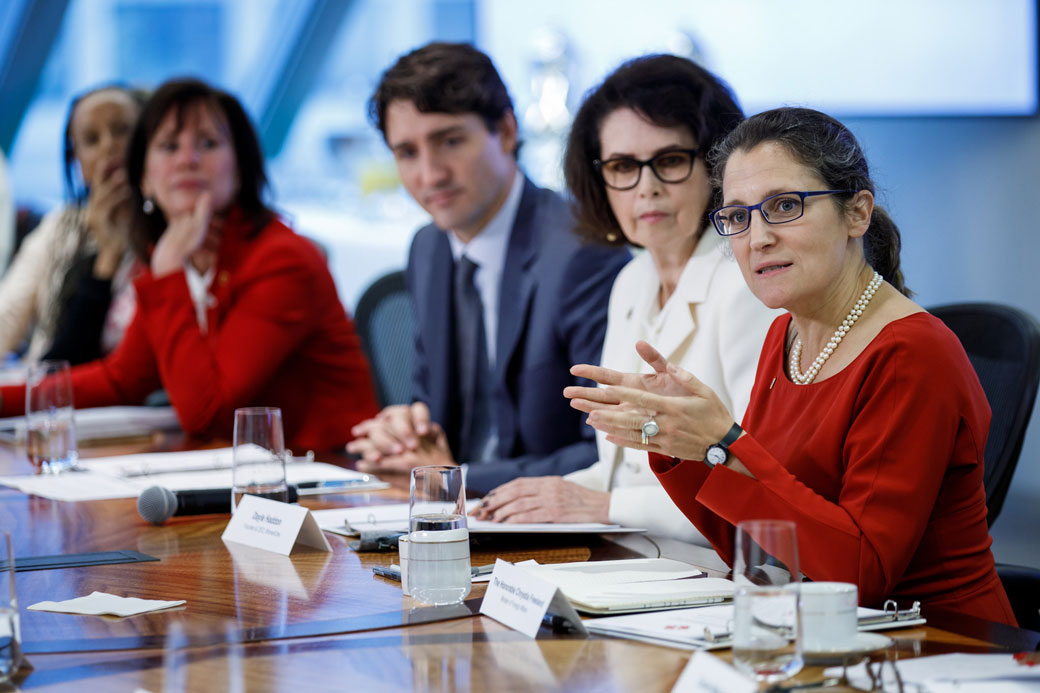On June 8-9, Canada will host the G7 summit at La Malbaie, in Quebec’s Charlevoix region, east of Quebec City.
Conveniently for golfer-in-chief and U.S. President Donald Trump and his occasional golf partner Prime Minister Abe of Japan, the two-day sessions are taking place at Le Manoir Richelieu, a golf resort.
That is not the only way the Liberal government has tried to accommodate the neighbour to the south.
From the moment of his first visit to Washington following the election of Trump, Trudeau fixed on women’s issues as the way to curry favour with the new U.S. president, and stave off his threats to kill NAFTA. Following his first visit with Trump in Washington, Trudeau co-chaired an event in New York to promote women in business with the president’s daughter.
In addition to giving Trump a slim opportunity to overcome his horrible worldwide reputation for disrespecting women, the Trudeau government was looking to find common ground with American opinion leaders, so as to advance NAFTA “modernization” through renegotiation, which was the Liberal government response to the campaign pledge by Trump to tear up the agreement.
The modernization renegotiation gambit has seemed to be working — at least according to regular leaks and Canadian Global Affairs Minister Chrystia Freeland, who was elevated from being trade minister to her current role following the election of Trump.
The Freeland mandate from the Prime Minister’s Office is to use all the resources of the Canadian government to rally support for NAFTA in the boardrooms of corporate America, Congress, and State Houses across the U.S., in order to make it harder for Trump to fulfill his goal of killing NAFTA.
The question raised by the strategy is what parts of the Canadian economy the Liberal government is prepared to sacrifice in pursuit of this objective. Dairy and agricultural income support ensuring food security for Canadians? What is left of the Ontario auto industry? Will policy initiatives such as pharmacare die because of new concessions on intellectual property rights?
An agreement in principle in the NAFTA renegotiations was slated to be announced in Washington following last weekend’s talks that included ministers from Mexico, Canada and the U.S.
Minister Freeland had even skipped a NATO foreign ministers’ meeting so she could sign on behalf of Canada.
By Monday, no agreement had been reached and none was in sight.
According to trade expert Peter Clark, who follows NAFTA talks closely on behalf of Canadian corporate clients, the negotiators have initialled six chapters of the 30 chapters under discussion, are discussing six more intensely, and still have lots to do on the remaining 18.
How this poorly advanced state of negotiations could give rise to an agreement in principle as was being suggested by government sources is hard to fathom.
For Clark, Canada has to deal with an uncomfortable truth: “The U.S. wants to make investment in Canada and Mexico unattractive for investors.”
Undeterred by Trump’s threats to kill it, major obstacles placed in the way of reaching a deal by the United States Trade Representative (USTR) Robert Lighthizer, and the need to tie things up before the current Congress expires this year, NAFTA talks will resume May 7, once again in Washington.
In the meantime, Lighthizer is on his way to China for the next stage in the U.S. shakedown of Beijing that features protectionist measures aimed at Chinese steel and aluminium exports.
Canada is doing its part by focusing on blocking rerouting of Chinese steel and aluminium shipments through Canada to the U.S.
Justin Trudeau has followed up on his initial engagements with the Trump administration, and made gender equality the priority item of his G7 presidency. Given the current context of the world economy, advocating gender equality is a noble attempt to throw some light on the darkness of right-wing populism, chauvinistic nationalism, and an America First focus on so-called trade cheaters — those that sell successfully into the U.S. market.
Last week in Ottawa, W7: Feminist visions for the G7, now a formal G7 advisory group, brought together over 60 women from Canada, other G7 countries, and the Global South to make recommendations to G7 leaders on all aspects of the global economy.
The Gender Equality Advisory Council, established by Trudeau for his G7 presidency, was also in session in Ottawa last week.
Co-chaired by American Melinda Gates, along with the Canadian Ambassador to France Isabelle Hudon, this body was charged by the prime minister to promote a transformative agenda of gender-based analysis and women’s empowerment in all areas of the G7’s work.
There is little that can be done to save Trump’s reputation with women, and it is doubtful that Canada will gain ground with his administration by raising the world profile of women’s issues, but on the feminization of economic policy, Trudeau is going in the right direction.
The prime minister just needs to be aware that feminists will be looking for implementation of W7 recommendations to the G7, following up on specific issues such as child-care availability, and speaking out about any inaction by his government in pursuing agenda items from the Gender Equality Advisory Council.
Duncan Cameron is president emeritus of rabble.ca and writes a weekly column on politics and current affairs.





